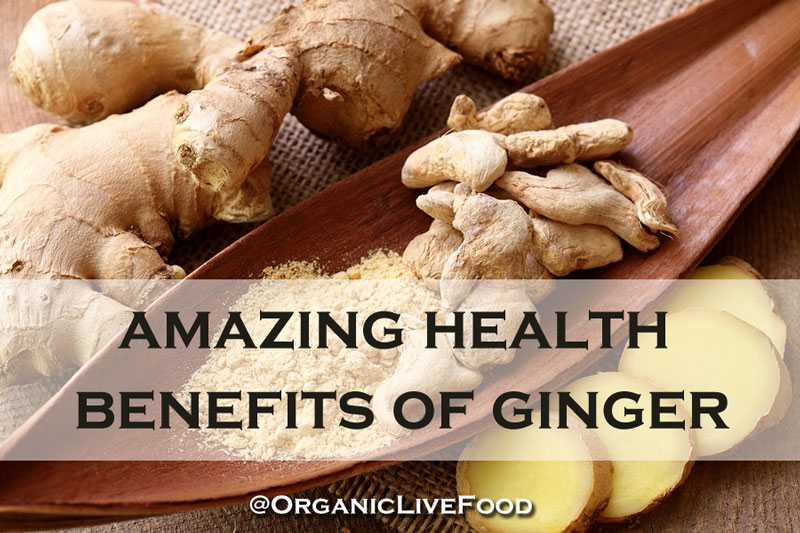
Ginger has been used for thousands of years for its healing and medicinal properties. The rich source of antioxidants (such as gingerols, shogaols, and zingerones), nutrients and bioactive compounds in ginger could benefit and reduce the risk of more than 150 different health conditions. The antibacterial and antiviral properties of ginger can help to fight cold and flu.
Herbs and spices such as turmeric, garlic and ginger have great medicinal properties and should be a part of your medicine cabinet. You could simply add these great spices to your dishes and enjoy their amazing taste and health benefits.
Ginger is very effective in lowering pain in muscles and joints. According to research, the anti-inflammatory agent in ginger can help to reduce knee pain in patients with arthritis. Researchers also suggest that ginger can lower pain and swelling in people with osteoarthritis and rheumatoid arthritis.
Study published in the Journal of Arthritis shows that ginger extract is more effective than drugs such as betamethasone (cortisone) and ibuprofen for treating osteoarthritis and rheumatoid arthritis. Other studies also show that ginger is a great painkiller and can lower severe headaches in patients with migraines.
According to researchers, the phytochemicals and antioxidants in ginger known as 6-shogaol is 10,000 times more effective than conventional cancer therapies such as chemo. Researchers suggest that 6-shogaol in ginger directly targets the root of breast cancer which is ‘breast cancer stem cells’. Another study published in Journal of Biological Chemistry also shows that the natural compound in ginger known as gingerol can suppress the growth of breast and colon cancer cells. Another study published in the Journal of the National Cancer Institute also indicates that gingerol can lower the growth of pancreatic tumors.
Diabetes affects more than 382 million people worldwide. While there are 25 million Americans who are diabetics, there are 79 million Americans who are pre-diabetic. Diabetes kills one person every 6 seconds and research shows that by 2035, the risk of diabetes is expected to increase by 55%.
However the good news is that ginger is diabetes worst enemy. According to a recent research published in journal Complementary and Integrative Medicine, ginger could effectively increase insulin release and inhibit enzymes in carbohydrate metabolism. Ginger could also protect liver, nervous system, and kidneys of people with diabetes. According to researchers, ginger could significantly reduce the blood glucose, triglyceride, and cholesterol level of patients with diabetes.
According to a research published at the American Thoracic Society International Conference, ginger has anti-inflammatory, antiseptic, antiviral and antibacterial compounds and can benefit patients with asthma.
Researchers suggest that ginger is more beneficial than the drug dimenhydrinate for treating vomiting and nausea in women during pregnancy. According to researchers, ginger can improve digestive issues and reduce motion sickness. Taking ginger could also lower chemotherapy-induced nausea researchers suggest.
According to researchers, the natural compounds in ginger can help to lower the body fat by boosting up your metabolism. Research also shows that ginger has a positive effect in increasing the energy level and fighting obesity.
According to research, both cinnamon and ginger have natural compounds that could lower muscle soreness in athletes. Another recent study published in The Journal of Pain suggests that daily intake of ginger is very effective in fighting muscle soreness.
According to researchers, ginger extract can improve cardio health by reducing the level of bad cholesterol and preventing atherosclerosis. Other research shows that ginger extract is even superior to the drug atorvastatin for lowering cholesterol.
Researchers suggest that the anti-inflammatory agents in ginger are potent painkiller that can relive the menstrual symptoms in women such as cramp and nausea. According to researchers, ‘ginger is as effective as mefenamic acid and ibuprofen in relieving pain in women with primary dysmenorrhea’.
According to a recent research published in the Indian Journal of Experimental Biology, ginger is great for treating Alzheimer's (AD). The study suggest that ginger may provide "multiple therapeutic molecular targets of AD and can be considered as an effective nontoxic nutraceutical supplement for AD."